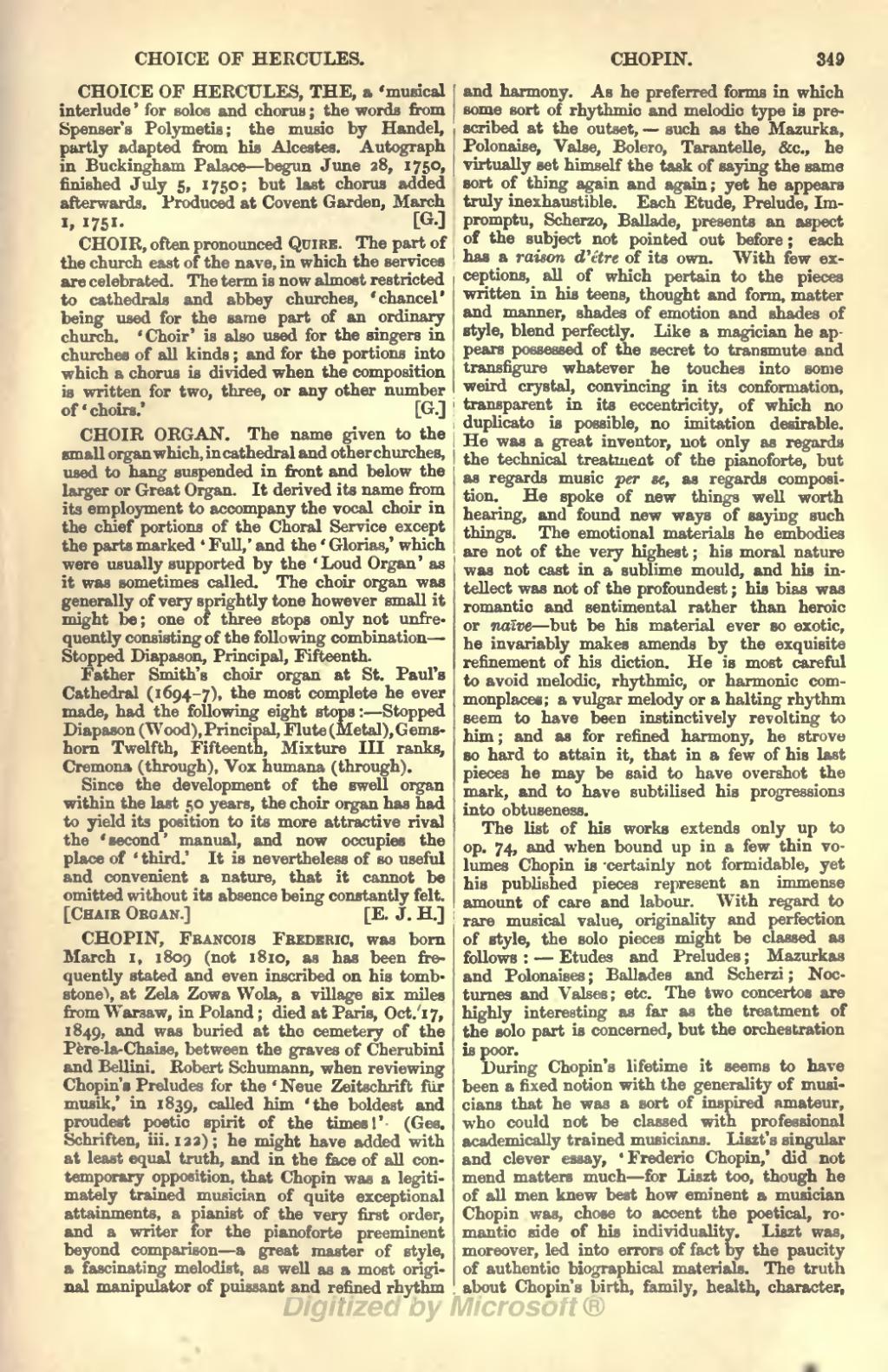CHOICE OF HERCULES, THE, a 'musical interlude' for solos and chorus; the words from Spenser's Polymetia; the music by Handel, partly adapted from his Alcestes. Autograph in Buckingham Palace—begun June 28, 1750, finished July 5, 1750; but last chorus added afterwards. Produced at Covent Garden, March 1, 1751.
CHOIR, often pronounced Quire. The part of the church east of the nave, in which the services are celebrated. The term is now almost restricted to cathedrals and abbey churches, 'chancel' being used for the same part of an ordinary church. 'Choir' is also used for the singers in churches of all kinds; and for the portions into which a chorus is divided when the composition is written for two, three, or any other number of 'choirs.'
CHOIR ORGAN. The name given to the small organ which, in cathedral and other churches, used to hang suspended in front and below the larger or Great Organ. It derived its name from its employment to accompany the vocal choir in the chief portions of the Choral Service except the parts marked 'Full,' and the 'Glorias,' which were usually supported by the 'Loud Organ' as it was sometimes called. The choir organ was generally of very sprightly tone however small it might be; one of three stops only not unfrequently consisting of the following combination—Stopped Diapason, Principal, Fifteenth.
Father Smith's choir organ at St. Paul's Cathedral (1694–7), the most complete he ever made, had the following eight stops:—Stopped Diapason (Wood), Principal, Flute (Metal), Gemshorn Twelfth, Fifteenth, Mixture III ranks, Cremona (through), Vox humana (through).
Since the development of the swell organ within the last 50 years, the choir organ has had to yield its position to its more attractive rival the 'second' manual, and now occupies the place of 'third.' It is nevertheless of so useful and convenient a nature, that it cannot be omitted without its absence being constantly felt. [ Chair Organ.]
CHOPIN, François Frederic, was born March 1, 1809 (not 1810, as has been frequently stated and even inscribed on his tomb-stone) at Zela Zowa Wola, a village six miles from Warsaw, in Poland; died at Paris, Oct. 17, 1849, and was buried at the cemetery of the Père-la-Chaise, between the graves of Cherubini and Bellini. Robert Schumann, when reviewing Chopin's Preludes for the 'Neue Zeitschrift für musik,' in 1839, called him 'the boldest and proudest poetic spirit of the times!' (Ges. Schriften, iii. 122); he might have added with at least equal truth, and in the face of all contemporary opposition, that Chopin was a legitimately trained musician of quite exceptional attainments, a pianist of the very first order, and a writer for the pianoforte preeminent beyond comparison—a great master of style, a fascinating melodist, as well as a most original manipulator of puissant and refined rhythm and harmony. As he preferred forms in which some sort of rhythmic and melodic type is prescribed at the outset, such as the Mazurka, Polonaise, Valse, Bolero, Tarantelle, &c., he virtually set himself the task of saying the same sort of thing again and again; yet he appears truly inexhaustible. Each Etude, Prelude, Impromptu, Scherzo, Ballade, presents an aspect of the subject not pointed out before; each has a raison d'étre of its own. With few exceptions, all of which pertain to the pieces written in his teens, thought and form, matter and manner, shades of emotion and shades of style, blend perfectly. Like a magician he appears possessed of the secret to transmute and transfigure whatever he touches into some weird crystal, convincing in its conformation, transparent in its eccentricity, of which no duplicate is possible, no imitation desirable. He was a great inventor, not only as regards the technical treatment of the pianoforte, but as regards music per se, as regards composition. He spoke of new things well worth hearing, and found new ways of saying such things. The emotional materials he embodies are not of the very highest; his moral nature was not cast in a sublime mould, and his intellect was not of the profoundest; his bias was romantic and sentimental rather than heroic or naïve—but be his material ever so exotic, he invariably makes amends by the exquisite refinement of his diction. He is most careful to avoid melodic, rhythmic, or harmonic commonplaces; a vulgar melody or a halting rhythm seem to have been instinctively revolting to him; and as for refined harmony, he strove so hard to attain it, that in a few of his last pieces he may be said to have overshot the mark, and to have subtilised his progressions into obtuseness.
The list of his works extends only up to op. 74, and when bound up in a few thin volumes Chopin is certainly not formidable, yet his published pieces represent an immense amount of care and labour. With regard to rare musical value, originality and perfection of style, the solo pieces might be classed as follows:—Etudes and Preludes; Mazurkas and Polonaises; Ballades and Scherzi; Nocturnes and Valses; etc. The two concertos are highly interesting as far as the treatment of the solo part is concerned, but the orchestration is poor.
During Chopin's lifetime it seems to have been a fixed notion with the generality of musicians that he was a sort of inspired amateur, who could not be classed with professional academically trained musicians. Liszt's singular and clever essay, 'Frederic Chopin,' did not mend matters much—for Liszt too, though he of all men knew best how eminent a musician Chopin was, chose to accent the poetical, romantic side of his individuality. Liszt was, moreover, led into errors of fact by the paucity of authentic biographical materials. The truth about Chopin's birth, family, health, character,
